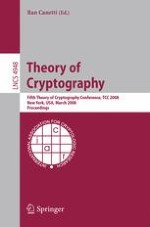2008 | OriginalPaper | Buchkapitel
Basing Weak Public-Key Cryptography on Strong One-Way Functions
verfasst von : Eli Biham, Yaron J. Goren, Yuval Ishai
Erschienen in: Theory of Cryptography
Verlag: Springer Berlin Heidelberg
Aktivieren Sie unsere intelligente Suche, um passende Fachinhalte oder Patente zu finden.
Wählen Sie Textabschnitte aus um mit Künstlicher Intelligenz passenden Patente zu finden. powered by
Markieren Sie Textabschnitte, um KI-gestützt weitere passende Inhalte zu finden. powered by
In one of the pioneering papers on public-key cryptography, Ralph Merkle suggested a heuristic protocol for exchanging a secret key over an insecure channel by using an idealized private-key encryption scheme. Merkle’s protocol is presumed to remain secure as long as the gap between the running time of the adversary and that of the honest parties is at most
quadratic
(rather than super-polynomial). In this work, we initiate an effort to base similar forms of public-key cryptography on well-founded assumptions.
We suggest a variant of Merkle’s protocol whose security can be based on the
one-wayness
of the underlying primitive. Specifically, using a one-way function of exponential strength, we obtain a key agreement protocol resisting adversaries whose running time is nearly quadratic in the running time of the honest parties. This protocol gives the adversary a small (but non-negligible) advantage in guessing the key. We show that the security of the protocol can be amplified by using a one-way function with a strong form of a hard-core predicate, whose existence follows from a conjectured “dream version” of Yao’s XOR lemma. On the other hand, we show that this type of hard-core predicate cannot be based on (even exponentially strong) one-wayness by using a black-box construction.
In establishing the above results, we reveal interesting connections between the problem under consideration and problems from other domains. In particular, we suggest a paradigm for converting (unconditionally) secure protocols in Maurer’s
bounded storage model
into (computationally) secure protocols in the random oracle model, translating storage advantage into computational advantage. Our main protocol can be viewed as an instance of this paradigm. Finally, we observe that a
quantum
adversary can completely break the security of our protocol (as well as Merkle’s heuristic protocol) by using the quadratic speedup of Grover’s quantum search algorithm. This raises a speculation that there might be a closer relation between (classical) public-key cryptography and quantum computing than is commonly believed.
